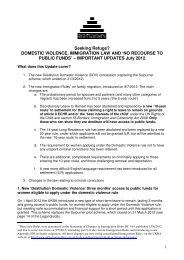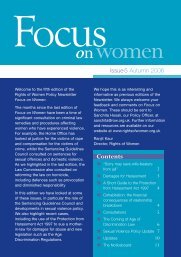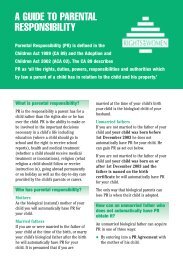Seeking Refuge? - Rights of Women
Seeking Refuge? - Rights of Women
Seeking Refuge? - Rights of Women
Create successful ePaper yourself
Turn your PDF publications into a flip-book with our unique Google optimized e-Paper software.
• not following customs or traditions by refusing<br />
to wear certain clothes;<br />
• carrying out activities such as hiding people,<br />
passing messages or giving food and shelter; or<br />
• involvement in the women’s movement.<br />
You may be persecuted because <strong>of</strong> a political<br />
opinion that you have, or an opinion that<br />
someone else thinks that you have.<br />
Membership <strong>of</strong> a particular social group is the<br />
most difficult <strong>of</strong> all the <strong>Refuge</strong>e Convention grounds<br />
to understand. Under the <strong>Refuge</strong>e Convention, a<br />
group will be a “particular social group” where:<br />
• members <strong>of</strong> the group share an innate<br />
characteristic, or a common background that<br />
cannot be changed, or share a characteristic or<br />
belief that is so fundamental to a person’s<br />
identity that she or he should not be made to<br />
change it; and / or 4<br />
• the group has a distinct identity in the relevant<br />
country because it is perceived as being<br />
different by surrounding society.<br />
Persecution cannot be the only factor that defines<br />
the group. This means that the group must have an<br />
identity that is different to the harm that is feared.<br />
An innate characteristic or common background<br />
could be your gender, sexual orientation (whether<br />
you are heterosexual or are a lesbian) or family<br />
membership. It does not matter if not everyone in<br />
the group sees themselves as part <strong>of</strong> it. Members<br />
<strong>of</strong> the group do not have to know each other, or<br />
work or live together (although they may do). A<br />
particular social group can be small, such as a<br />
family, or large, including all women in a<br />
particular country or area. Not every member <strong>of</strong><br />
the group has to have been persecuted for a<br />
group to be found to exist. What is important is<br />
that you have a well-founded fear <strong>of</strong> persecution<br />
because <strong>of</strong> your membership <strong>of</strong> the group.<br />
The fact that, in your country, violence against<br />
women is socially or culturally accepted is not<br />
relevant in deciding whether you are a member <strong>of</strong><br />
a particular social group, or whether the harm you<br />
have experienced or suffered amounts to<br />
persecution.<br />
Some examples <strong>of</strong> people who have been<br />
recognised as members <strong>of</strong> a particular social<br />
group in the UK are:<br />
• women in Pakistan;<br />
• women in Afghanistan;<br />
• women in Kenya (particularly Kikuyu women<br />
under 65); and,<br />
• women in Sierra Leone and / or women in<br />
Sierra Leone who are at risk <strong>of</strong> female genital<br />
mutilation; and<br />
• people who have been trafficked from Moldova<br />
for the purposes <strong>of</strong> sexual exploitation (who<br />
have been forced into prostitution).<br />
What happens if you are<br />
persecuted because <strong>of</strong> an<br />
identity someone thinks you<br />
have? Imputed Convention<br />
Reasons<br />
It may be that you have been persecuted because<br />
those responsible for the persecution believe<br />
(rightly or wrongly) that you are <strong>of</strong> a particular<br />
race, religion or political opinion, or that you are a<br />
member <strong>of</strong> a particular social group. This is called<br />
imputing an identity to a person. For example, a<br />
woman may be persecuted because her husband<br />
is known to hold a particular political view and<br />
those responsible for the persecution believe that<br />
she also holds that view.<br />
The <strong>Refuge</strong>e Convention protects individuals who<br />
have a well-founded fear <strong>of</strong> persecution because<br />
<strong>of</strong> an imputed <strong>Refuge</strong>e Convention reason. This<br />
means that a woman who is persecuted because<br />
it is thought that she has the same political views<br />
as her husband could claim asylum on the basis <strong>of</strong><br />
her imputed political opinion. She would be<br />
protected by the <strong>Refuge</strong>e Convention.<br />
<strong>Women</strong> and the <strong>Refuge</strong>e<br />
Convention<br />
<strong>Women</strong> may be persecuted for many reasons<br />
but sometimes they are persecuted for their<br />
gender.<br />
Gender is not only about whether you are a<br />
woman or a man, but includes all <strong>of</strong> the<br />
differences there are between women and<br />
men, including physical, social or cultural<br />
differences. Gender includes the way that<br />
women are treated because they are women,<br />
the way that they are supposed to dress or<br />
behave and the rights that they have (or do<br />
not have).<br />
The <strong>Refuge</strong>e Convention reasons do not include<br />
gender. This means that a woman who has<br />
experienced persecution because <strong>of</strong> her gender<br />
has to fit her claim for protection within one or<br />
more <strong>of</strong> the <strong>Refuge</strong>e Convention reasons<br />
explained above.<br />
14
















